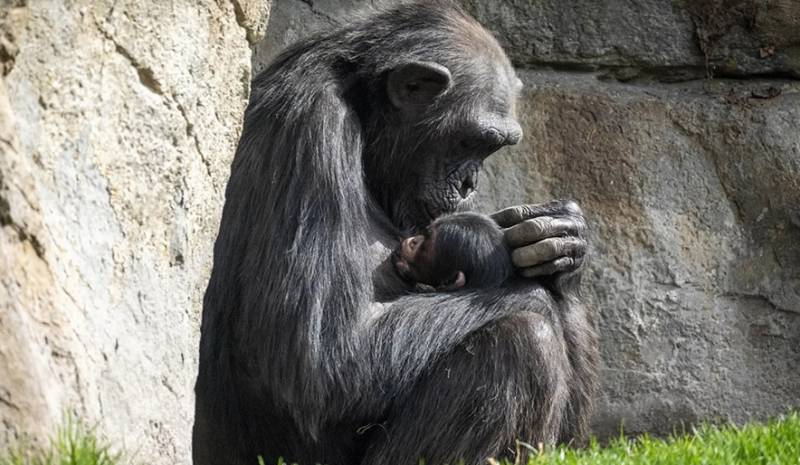Heartbreak for mum over dead baby chimp at Bioparc, Valencia. A mother chimp has refused to be parted from the cadaver of her baby who died in February. Eugene Costello reports…
There is widespread heartbreak for a mum over her dead baby chimp at Bioparc, Valencia. A mother chimp has refused to be parted from the cadaver of her baby who died in February.
Despite the advanced state of decomposition of the baby, a chimpanzee, her mum, Natalia, refuses to separate from the body of the offspring.
The baby chimpanzee died at the beginning of February at the Bioparc in Valencia. It was a devastating event, but on analysing the data, it shows that is a normal occurrence. There is a high mortality rate in chimpanzee babies of such a young age. What is not normal, however, is the mourning that the mother of the offspring has been going through ever since.
In a study published by Current Biology, researchers analyse mourning type behaviour that includes carrying baby’s corpses for extended periods. They possit that this is an example of the primates mirroring human responses to death.
In an example of chimpanzee grieving, a research group led by Dora Biro, a zoologist at the University of Oxford in the UK, observed two chimp mothers carrying the remains of their dead infants for weeks. This was in the forests of Bossou, Guinea, where primatologists have been studying wild chimps for three decades. In 2003, an epidemic of respiratory disease broke out at Bossou, killing five chimps. Two were infants, 1-year-old Jimato and 2-year-old Veve. The mothers of the infants carried their dead bodies around on their backs for 68 and 19 days respectively, even as they dried out and became mummified. They brushed flies away from the babies, groomed them regularly, and allowed other chimps – including other young animals – to poke at the bodies, lift their limbs, and even carry them around for short distances.
This mother chimpanzee cannot get over the death of her offspring. Natalia has been carrying the body for months. Despite the advanced state of decomposition of the baby, Natalia will not leave the body of her offspring. A spokesperson for the Bioparc explains that these animals need a period of mourning until they come to terms with the reality and the loss. “It is a species where social bonds and group cohesion are fundamental, so all group members are affected by these sad events,” they say. But no one expected that the mother would need so much time to shed Natalia’s lifeless body.
Heartbreak for mum at Bioparc
The baby chimpanzee was born in February with another baby chimpanzee. From that moment on, an intense monitoring protocol was activated, as Natalia had already lost a baby in 2018. Bioparc consulted a group of international experts. They provided direct observation, videos and detailed photographs to check if the breeding was going well.
Everything was going well, apparently. At the time of death, the udders of the female had little volume, but the teats and suckling of the calf were evidence of good feeding. The baby had shown normal activity until the previous day, but the little chimp eventually died of natural causes.

When his heart stopped beating, the park keepers carried out an intervention. But it was very limited. To their distress, they were unable to prevent the fatal outcome. The other baby did survive and is now in perfect condition. But it seems that not even his existence is giving the mother the support she needs at this time.
Extreme postnatal depression
The Bioparcs in Fuengirola and Valencia are home to Spain’s largest group of chimpanzees of the subspecies Pan troglodytes verus. These arecritically endangered according to the Red List of the International Union for Conservation of Nature (IUCN). As such, they have a prominent role in the European programme for their protection (EEP).
For this reason, decisions must be taken in consensus with the people responsible for the project and taking into account the difficulties and characteristics of this peculiar species. So, as Bioparc explains, “despite the feeling of helplessness, the reality is that the action only makes it possible to provide medication.”
Taking the calf away from the mother would imply a very dangerous anaesthesia for several members of the group”, something that could endanger their lives. It is often said that there is only 2% difference genetically between humans and chimps. So we only only empathise with such suffering. Truly heartbreaking to see.